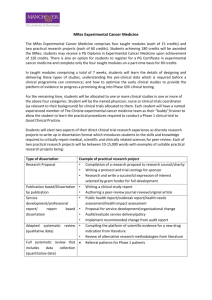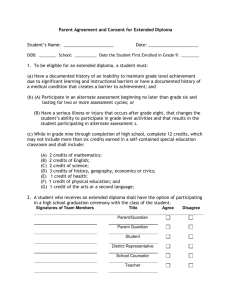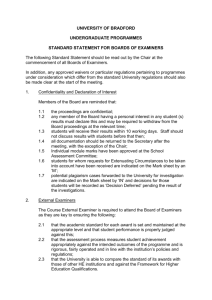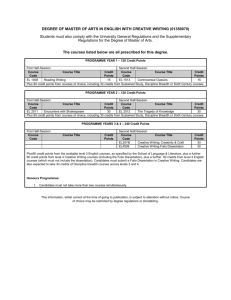other History courses
advertisement
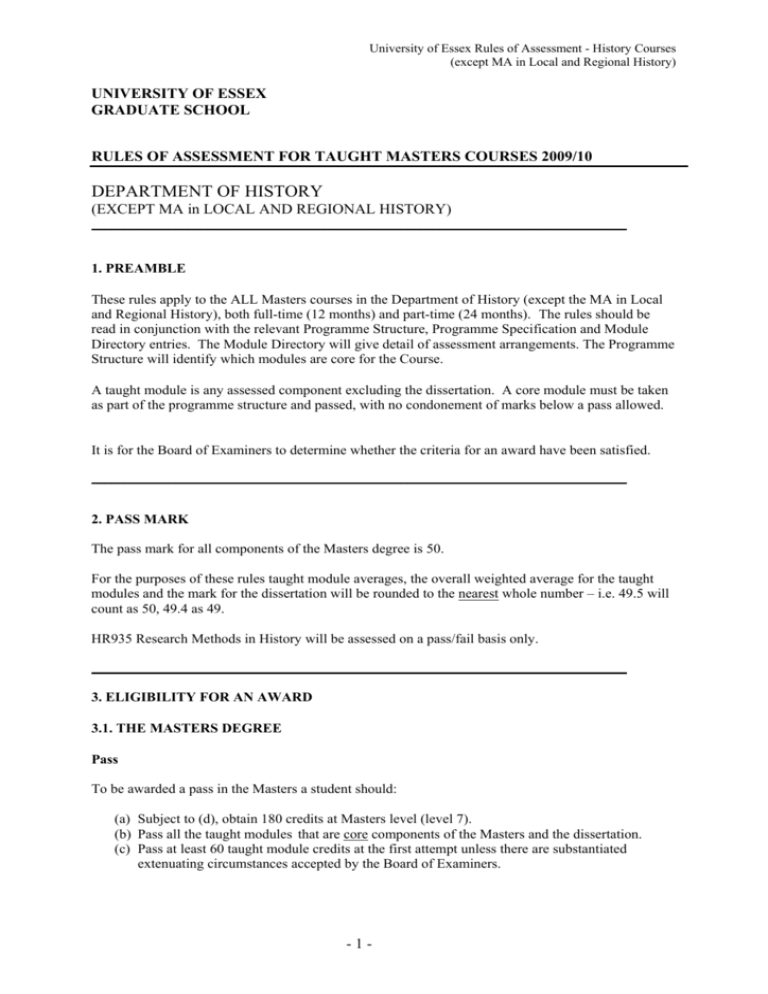
University of Essex Rules of Assessment - History Courses (except MA in Local and Regional History) UNIVERSITY OF ESSEX GRADUATE SCHOOL RULES OF ASSESSMENT FOR TAUGHT MASTERS COURSES 2009/10 DEPARTMENT OF HISTORY (EXCEPT MA in LOCAL AND REGIONAL HISTORY) ___________________________________________________________________________________ 1. PREAMBLE These rules apply to the ALL Masters courses in the Department of History (except the MA in Local and Regional History), both full-time (12 months) and part-time (24 months). The rules should be read in conjunction with the relevant Programme Structure, Programme Specification and Module Directory entries. The Module Directory will give detail of assessment arrangements. The Programme Structure will identify which modules are core for the Course. A taught module is any assessed component excluding the dissertation. A core module must be taken as part of the programme structure and passed, with no condonement of marks below a pass allowed. It is for the Board of Examiners to determine whether the criteria for an award have been satisfied. ___________________________________________________________________________________ 2. PASS MARK The pass mark for all components of the Masters degree is 50. For the purposes of these rules taught module averages, the overall weighted average for the taught modules and the mark for the dissertation will be rounded to the nearest whole number – i.e. 49.5 will count as 50, 49.4 as 49. HR935 Research Methods in History will be assessed on a pass/fail basis only. ___________________________________________________________________________________ 3. ELIGIBILITY FOR AN AWARD 3.1. THE MASTERS DEGREE Pass To be awarded a pass in the Masters a student should: (a) Subject to (d), obtain 180 credits at Masters level (level 7). (b) Pass all the taught modules that are core components of the Masters and the dissertation. (c) Pass at least 60 taught module credits at the first attempt unless there are substantiated extenuating circumstances accepted by the Board of Examiners. -1- University of Essex Rules of Assessment - History Courses (except MA in Local and Regional History) (d) Failure with a mark of 40 or more for up to 40 credits in non-core taught modules, will be condoned provided the overall weighted average for all the taught modules, excluding HR935, is 50. A Pass with Merit or Distinction Results for a Pass with Merit or Distinction are calculated by two methods, known as ‘Dominant Quality’ and ‘Arithmetic Average’. Students will receive the more favourable result of the two. Pass with Merit Dominant Quality To obtain a merit a student should: (a) Obtain 180 credits at the first attempt except in the case of substantiated extenuating circumstances accepted by the Board of Examiners; (b) Obtain 120 credits at 60 or above, including the dissertation; (c) Have no module mark below 50. Arithmetic Average To obtain a merit a student should: (a) Obtain 180 credits at the first attempt except in the case of substantiated extenuating circumstances accepted by the Board of Examiners; (b) Obtain 90 credits at 60 or above, which must include the dissertation; (c) Have an overall weighted average mark of 60 or more; (d) Have no module mark below 50. Pass with Distinction Dominant Quality To obtain a distinction a student should: (a) Obtain 180 credits at the first attempt, except in the case of substantiated extenuating circumstances accepted by the Board of Examiners (b) Obtain 120 credits at 70 or above, including the dissertation; (c) Have no module mark below 50. Arithmetic Average To obtain a distinction a student should: (a) Obtain 180 credits at the first attempt except in the case of substantiated extenuating circumstances accepted by the Board of Examiners; (b) Obtain 90 credits at 70 or above, which must include the dissertation; (c) Have an overall weighted average mark of 70 or more; (d) Have no module mark below 50. -2- University of Essex Rules of Assessment - History Courses (except MA in Local and Regional History) 3.2. THE POSTGRADUATE DIPLOMA and CERTIFICATE Where a student is either unable to complete their studies or does not achieve the required credits to be awarded a Masters, then the award of either a Postgraduate Diploma or a Postgraduate Certificate will be considered. The programme structure identifies which taught modules have to be passed in order to obtain a PG Certificate or PG Diploma. In many cases it will be possible to obtain the necessary credits for a PG Diploma by using dissertation credits as well as taught module credits. To be awarded a POSTGRADUATE DIPLOMA a student should: (a) (b) (c) (d) (e) Normally complete and have been assessed for all the taught Masters modules Subject to (e), obtain 120 credits at Masters level (level 7). Pass at least 60 taught module credits at the first attempt. Pass all taught modules that are core components of the Postgraduate Diploma. Failure with a mark of 40 or more for up to 30 credits in non-core modules will be condoned provided that the overall weighted average for the 120 PG Diploma credits, excluding HR935, is 50. Credits obtained for the dissertation can be used when considering whether a Postgraduate Diploma can be awarded, provided that the above criteria have been met. To be awarded a POSTGRADUATE CERTIFICATE a student should: (a) (b) (c) (d) Subject to (d), obtain 60 taught module credits at Masters level (level 7). Pass all taught modules that are core components for the Postgraduate Certificate. Pass 15 credits at the first attempt. Failure with a mark of 40 or more for up to 20 credits, in non-core modules, will be condoned. Dissertation credits cannot be used to obtain a Postgraduate Certificate. ________________________________________________________________________________________ 4. SECOND ATTEMPTS 4.1 Second attempts at the assessment for taught modules (a) Students may have a second attempt for module(s) that have been failed, up to a maximum of 40 taught module credits. (b) No second attempt at the assessment for a module is permitted prior to the Board of Examiners meeting where marks are confirmed and is subject to departmental arrangements (see below). (c) The maximum mark that may be recorded for a module as a result of a second attempt is 50, unless there are substantiated extenuating circumstances accepted by the Board of Examiners. (d) The mark for the second attempt will count even where it is lower than the original mark. If a student fails a module on the second attempt at the assessment no further attempt is allowed unless there are substantiated extenuating circumstances accepted by the Board of Examiners. Where the Board of Examiners permits a student to have a second attempt at the assessment for a module this only applies to any individual assignment/examination for the module that has been failed. A student cannot be permitted to retake a module unless permitted by the Board of Examiners because of substantiated extenuating circumstances. -3- University of Essex Rules of Assessment - History Courses (except MA in Local and Regional History) When a student is required to resubmit work as a result of an academic offence, this should count as a second attempt. This meaning that the student would not be eligible for a merit or distinction. If the student fails the module after having had this reassessment opportunity s/he should not be permitted further reassessment. 4.2 Re-submission of Dissertations (a) Re-submission of dissertations is only permitted in the following circumstances: (i) Either substantiated extenuating circumstances accepted at the discretion of the Board of Examiners; or (ii) Where the original mark awarded is at least 40 and the Board of Examiners judges that the work required does not include any additional experimental or practical work. (b) Re-submission is subject to the following conditions: (i) A dissertation must normally be re-submitted within two months of the formal notification of permission to resubmit; in cases of extenuating circumstances, this may be extended to a maximum of twelve months; (ii) A dissertation which has been re-submitted because of a marginal fail shall be awarded no more than the minimum pass mark; in the case of re-submissions because of extenuating circumstances, the full range of marks shall be available to examiners. __________________________________________________________________________________ 5. ASSESSMENT PROCEDURES 5.1 POWERS OF THE BOARD OF EXAMINERS The Board of Examiners shall have the following powers: (a) Confirming the taught module marks achieved, including any resit marks presented to the Board, and awarding credit. (b) Confirming dissertation/project marks. (c) Confirming any opportunities for second attempts at the assessment for modules, including resubmission of the dissertation. (d) Considering each student’s marks’ profile so that they can be advised on the range of possible award outcomes, including whether it is possible for them to make use of dissertation credits. (e) Considering extenuating circumstances as necessary and their implications for results. (f) Determining the appropriate award for each student. (g) Requiring any student whose performance is below that required to achieve an award to withdraw An Interim Board of Examiners Meeting shall normally be held at the end of the taught module assessment or at the end of a stage of study for a part-time scheme. Students will be required to withdraw where the accumulation of further credit would not result in the achievement of any postgraduate award according to the Rules of Assessment. 5.2 EXTENUATING CIRCUMSTANCES Extenuating circumstances can only be considered by the Examination Board if the student has submitted an extenuating circumstances form by the agreed deadline. When substantiated extenuating -4- University of Essex Rules of Assessment - History Courses (except MA in Local and Regional History) circumstances are accepted by the Board of Examiners it may use its discretion to depart from the above rules where this is necessary to achieve a fair result. 5.3 DISCRETION Except in the case of extenuating circumstances (see 5.2 above), the Board of Examiners should restrict its use of discretion to exceptional circumstances. Where the Board of Examiners agrees to exercise its discretion the reasons must be documented as part of the Examination Board report, setting out the reason for exercising discretion and the reason for the decision taken, and a copy sent to the Graduate School. ________________________________________________________________________________________ End SENATE JULY 2009 -5-
